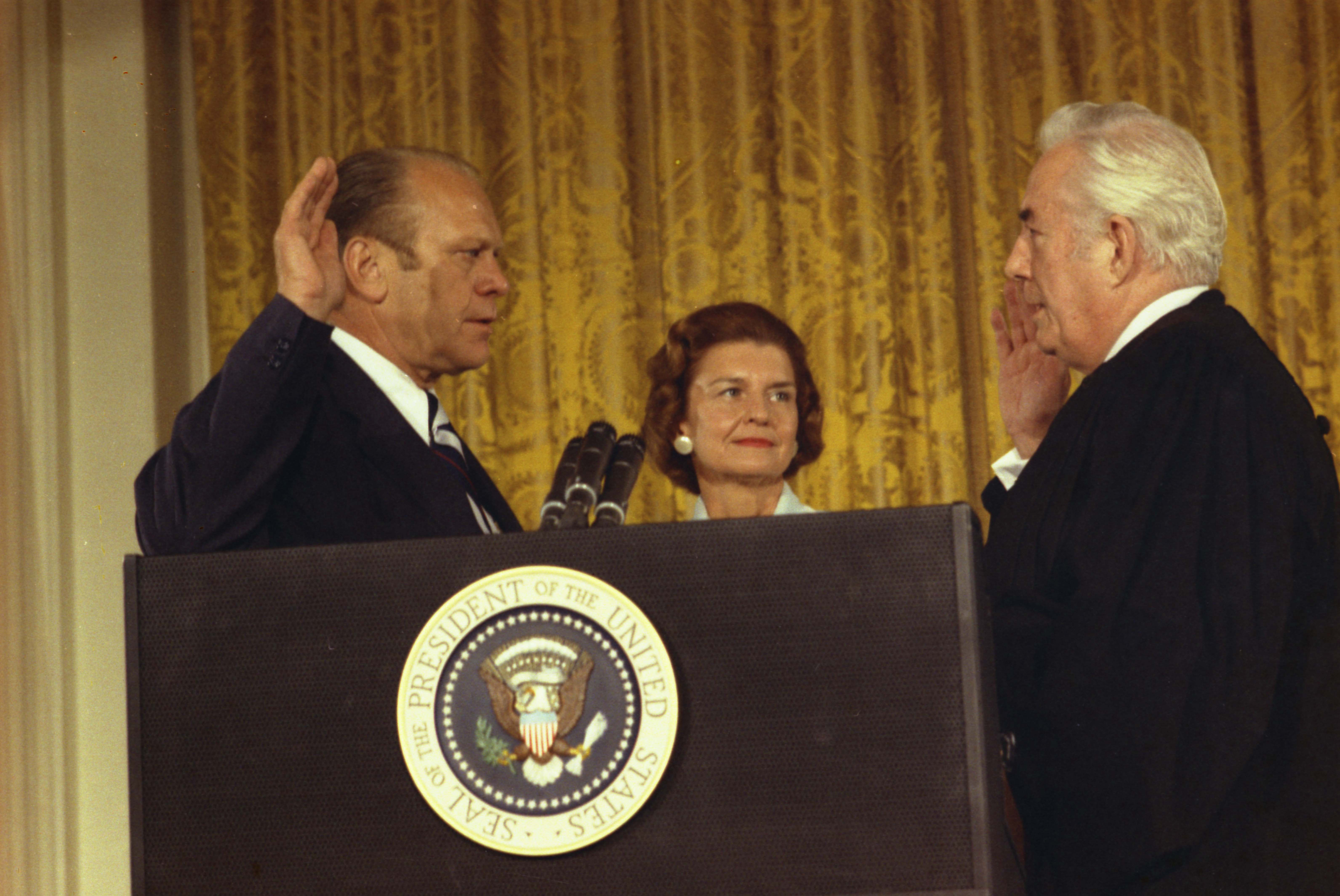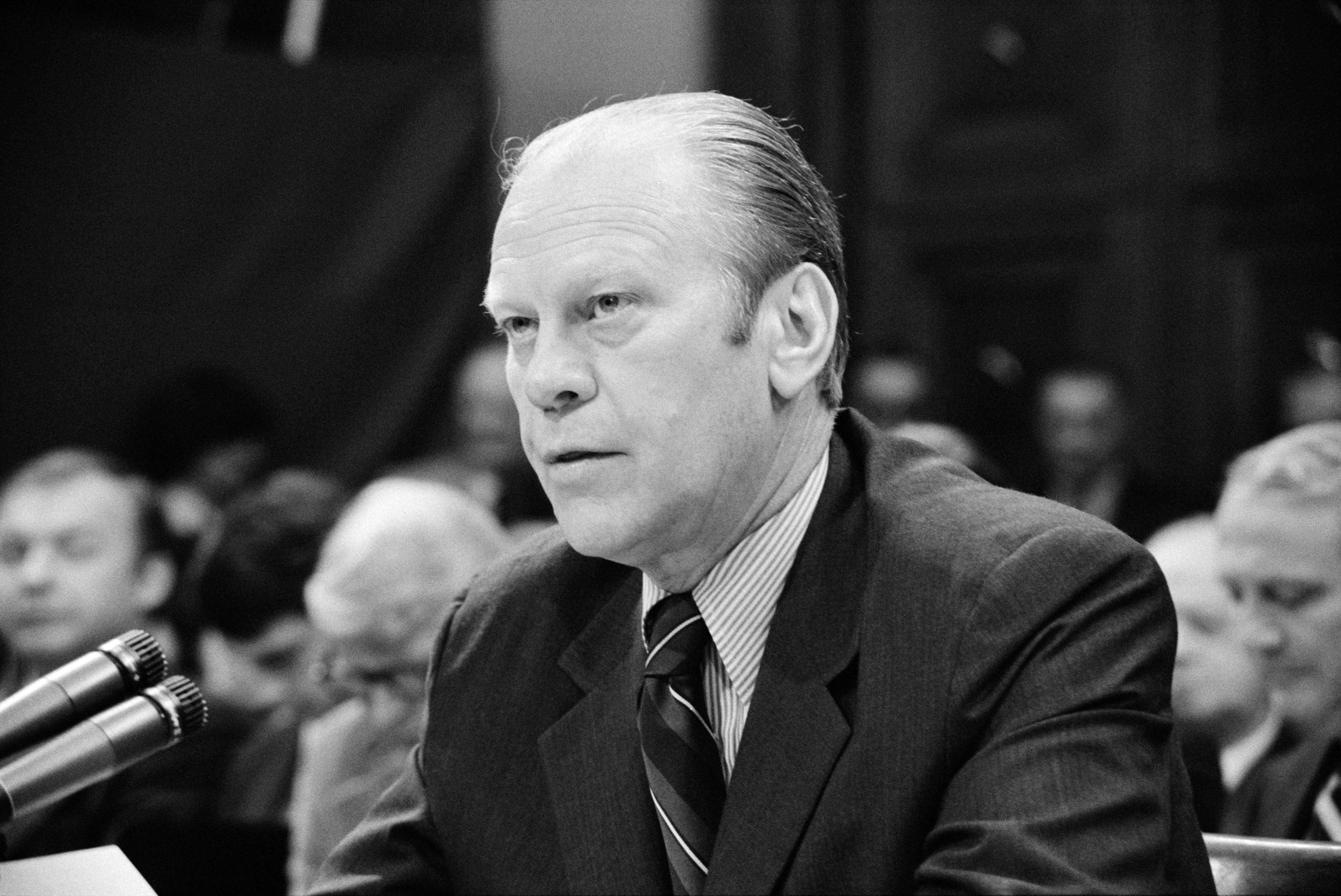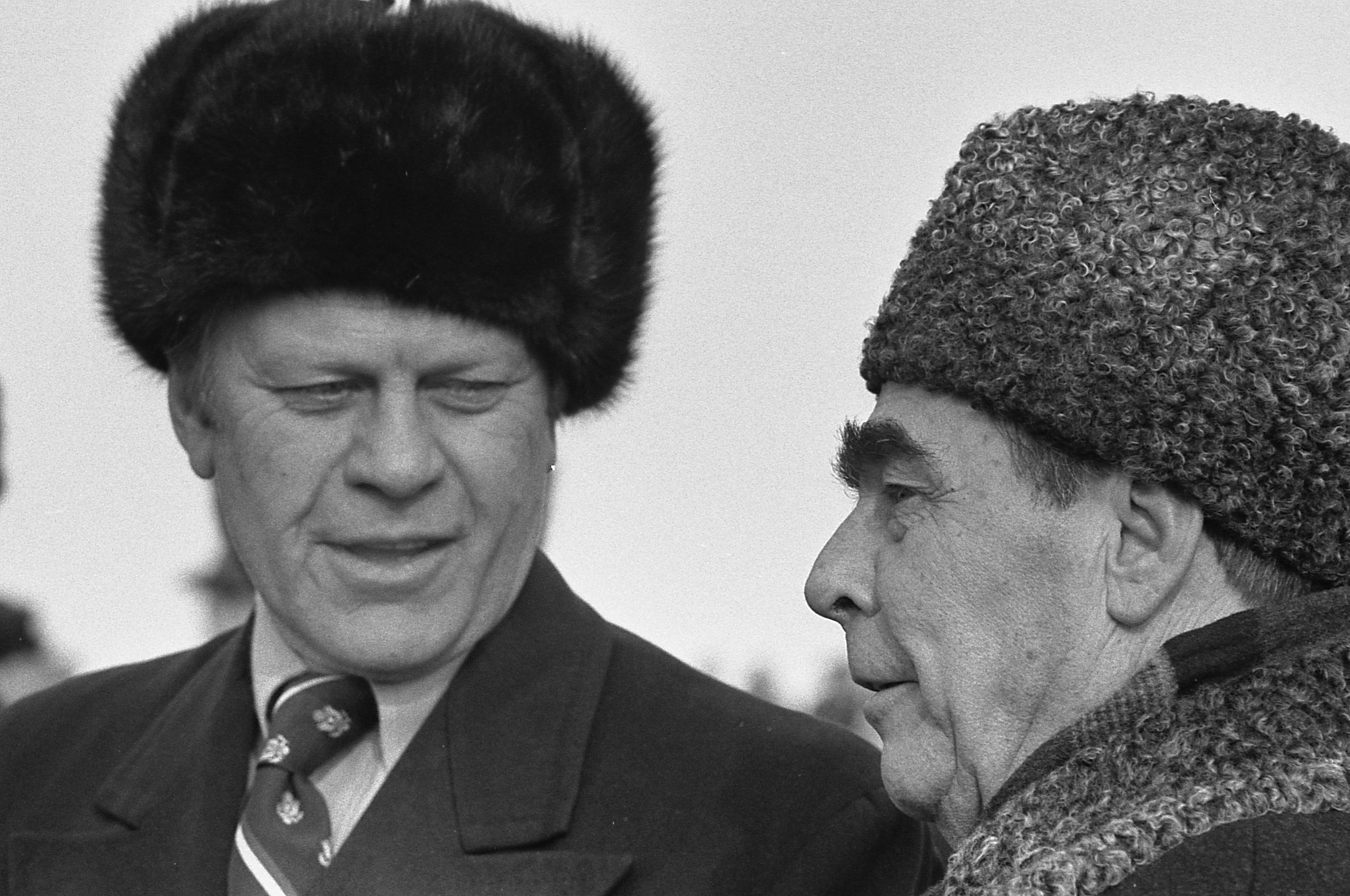Timeline Of The Gerald Ford Presidency (1974) on:
[Wikipedia]
[Google]
[Amazon]
The following is a timeline of the presidency of Gerald Ford from August 9, 1974, when Ford became the 38th president of the United States, upon the resignation of Richard Nixon, to December 31, 1974.
 *August 9 – Gerald Ford takes the
*August 9 – Gerald Ford takes the
 *October 17 – Ford appears before the House Judiciary Subcommittee on Criminal Justice to explain the facts and circumstances that were the basis for his pardon of former President Richard Nixon. He is the first sitting president since Abraham Lincoln to testify before the House of Representatives .
*October 17 – Ford vetoes the
*October 17 – Ford appears before the House Judiciary Subcommittee on Criminal Justice to explain the facts and circumstances that were the basis for his pardon of former President Richard Nixon. He is the first sitting president since Abraham Lincoln to testify before the House of Representatives .
*October 17 – Ford vetoes the
 *November 19–24 – Ford makes the second international trip of his presidency:
**November 19–22 –
*November 19–24 – Ford makes the second international trip of his presidency:
**November 19–22 –
Miller Center Ford Presidential Timeline
1974 in the United States
August
 *August 9 – Gerald Ford takes the
*August 9 – Gerald Ford takes the oath of office
An oath of office is an oath or affirmation a person takes before assuming the duties of an office, usually a position in government or within a religious body, although such oaths are sometimes required of officers of other organizations. Such ...
as president, administered by Chief Justice Warren Burger, in the East Room
The East Room is an event and reception room in the Executive Residence, which is a building of the White House complex, the home of the president of the United States. The East Room is the largest room in the Executive Residence; it is used for ...
of the White House. Immediately afterward, he speaks to the assembled audience in a speech broadcast live to the nation. Ford notes the peculiarity of his position, saying "I am acutely aware that you have not elected me as your president by your ballots, and so I ask you to confirm me as your president with your prayers." He also declares, "My fellow Americans, our long national nightmare is over. Our Constitution works; our great Republic is a government of laws and not of men. Here, the people rule. But there is a higher Power, by whatever name we honor Him, who ordains not only righteousness but love, not only justice, but mercy. ... let us restore the golden rule to our political process, and let brotherly love purge our hearts of suspicion and hate." This remains the most recent non-scheduled presidential inauguration in American history.
*August 9 – Following the swearing-in ceremony, President Ford meets with Congressional leaders, senior White House staff, transition advisers, senior economic advisers, and foreign emissaries.
*August 9 – Jerald terHorst is appointed to serve as President Ford's White House Press Secretary.
*August 12 – President Ford addresses a Joint session of the United States Congress. He states, "I do not want a honeymoon with you. I want a good marriage." He also states his first priority is to bring inflation under control, declaring it "public enemy number one."
*August 17 – President Ford signs his first piece of legislation, The Forest and Rangeland Renewable Resources Act, with the goal of protecting forest resources, among other goals.
*August 15–18 – President Ford hosts King Hussein of Jordan. He is the first foreign head of state to be received by President Ford.
*August 19 – President Ford delivers a major speech to the Veterans of Foreign Wars
The Veterans of Foreign Wars (VFW), formally the Veterans of Foreign Wars of the United States, is an organization of US war veterans, who, as military service members fought in wars, campaigns, and expeditions on foreign land, waters, or a ...
convention in Chicago, supporting earned clemency for Vietnam War draft evaders.
*August 19 – Rodger Davies
Rodger Paul Davies (May 7, 1921 – August 19, 1974) was an American diplomat born in Berkeley, California, who was killed in the line of duty on August 19, 1974, in Nicosia, Cyprus, allegedly by Greek Cypriot gunmen during an anti-American demon ...
, the United States Ambassador to Cyprus
This is a list of ambassadors of the United States to Cyprus.
Until 1960 Cyprus had been a colony of the British Empire. On August 16, 1960, Cyprus gained its independence from the United Kingdom. The United States diplomatic recognition, recogni ...
, along with Antoinette Varnavas, an embassy secretary, and a Greek Cypriot national are killed by sniper
A sniper is a military/paramilitary marksman who engages targets from positions of concealment or at distances exceeding the target's detection capabilities. Snipers generally have specialized training and are equipped with high-precision r ...
fire during an anti-American demonstration outside the U.S. Embassy in Nicosia, protesting against the failure of the U.S. to stop the Turkish invasion of Cyprus. Afterwards, the U.S. government quickly sends his replacement, Ambassador to Yemen William R. Crawford, in order to demonstrate that "it was not blaming Greek-Cypriot authorities for the murder".
*August 20 – President Ford nominates Nelson Rockefeller, former governor of New York, to be vice president.
*August 22 – President Ford signs the Housing and Community Development Act of 1974.
*August 28 – President Ford holds his first press conference as president. Many of the questions concern unresolved issues surrounding Watergate.
September
*September 8 – President Ford issues a proclamation which grants former president Nixon a full and unconditional pardon for any crimes he might have committed against the United States while President. The surprise announcement stuns the country and Ford's approval rating plummets in the polls. Press Secretary Jerald terHorst resigns in protest after the pardon. *September 16 – President Ford issues a proclamation announcing an amnesty program for Vietnam Eradraft evaders
Draft evasion is any successful attempt to elude a government-imposed obligation to serve in the military forces of one's nation. Sometimes draft evasion involves refusing to comply with the military draft laws of one's nation. Illegal draft ev ...
and military deserters
Desertion is the abandonment of a military duty or post without permission (a pass, liberty or leave) and is done with the intention of not returning. This contrasts with unauthorized absence (UA) or absence without leave (AWOL ), which ar ...
who return home. The conditions of the amnesty required the individual to reaffirm their allegiance to the United States and serve two years working in a public service job or a total of two years' service for those who had served less than two years of honorable service in the military. A Clemency Board was established to review personnel records and to make recommendations for receiving a Presidential Pardon and a change in Military discharge status.
*September 26–28 – First Lady
First lady is an unofficial title usually used for the wife, and occasionally used for the daughter or other female relative, of a non-monarchical
A monarchy is a form of government in which a person, the monarch, is head of state fo ...
Betty Ford is diagnosed with breast cancer and undergoes surgery.
*September 27–28 – The White House convenes a "summit conference" on inflation and the economy. President Ford closes the conference with an address to the American people, asking them to send him a list of ten inflation-reducing ideas.
October
*October 8 – Ford announces hisWhip Inflation Now
''Whip Inflation Now'' (''WIN'') was a 1974 attempt to spur a grassroots movement to combat inflation in the US, by encouraging personal savings and disciplined spending habits in combination with public measures, urged by U.S. President Gerald ...
program before a joint session of Congress.
*October 11 – Ford signs the Energy Reorganization Act of 1974 establishing the Nuclear Regulatory Commission
The Nuclear Regulatory Commission (NRC) is an independent agency of the United States government tasked with protecting public health and safety related to nuclear energy. Established by the Energy Reorganization Act of 1974, the NRC began operat ...
.
*October 15 – Ford signs the Federal Election Campaign Act Amendments of 1974
The Federal Election Campaign Act of 1971 (FECA, , ''et seq.'') is the primary United States federal law regulating political campaign fundraising and spending. The law originally focused on creating limits for campaign spending on communicatio ...
, which seek to regulate campaign fundraising and spending.
 *October 17 – Ford appears before the House Judiciary Subcommittee on Criminal Justice to explain the facts and circumstances that were the basis for his pardon of former President Richard Nixon. He is the first sitting president since Abraham Lincoln to testify before the House of Representatives .
*October 17 – Ford vetoes the
*October 17 – Ford appears before the House Judiciary Subcommittee on Criminal Justice to explain the facts and circumstances that were the basis for his pardon of former President Richard Nixon. He is the first sitting president since Abraham Lincoln to testify before the House of Representatives .
*October 17 – Ford vetoes the Freedom of Information Act Freedom of Information Act may refer to the following legislations in different jurisdictions which mandate the national government to disclose certain data to the general public upon request:
* Freedom of Information Act 1982, the Australian act
* ...
Amendments believing not enough protection is given to sensitive and classified intelligence documents. Congress overrides Ford's veto on November 21, 1974, making the bill law.
*October 21 – Ford makes the first international trip of his presidency, travelling to Nogales and Magdalena de Kino, Mexico. There he meets with President Luis Echeverría and lay a wreath at the tomb of Padre Eusebio Kino
Eusebio Francisco Kino ( it, Eusebio Francesco Chini, es, Eusebio Francisco Kino; 10 August 1645 – 15 March 1711), often referred to as Father Kino, was a Tyrolean Jesuit, missionary, geographer, explorer, cartographer and astronomer born i ...
.
November
*November 1 – Ford meets with an ailing Richard Nixon in a Long Beach, California hospital. *November 5 –Republicans
Republican can refer to:
Political ideology
* An advocate of a republic, a type of government that is not a monarchy or dictatorship, and is usually associated with the rule of law.
** Republicanism, the ideology in support of republics or agains ...
lose 40 seats in the House and 4 in the Senate, widening the Democratic majority in Congress during the 1974 midterm elections.
 *November 19–24 – Ford makes the second international trip of his presidency:
**November 19–22 –
*November 19–24 – Ford makes the second international trip of his presidency:
**November 19–22 – State visit
A state visit is a formal visit by a head of state to a foreign country, at the invitation of the head of state of that foreign country, with the latter also acting as the official host for the duration of the state visit. Speaking for the host ...
to Tokyo and Kyoto; meets with Prime Minister Kakuei Tanaka
was a Japanese politician who served in the House of Representatives (Japan), House of Representatives from 1947 Japanese general election, 1947 to 1990 Japanese general election, 1990, and was Prime Minister of Japan from 1972 to 1974.
After ...
. This is the first visit to that country by an incumbent American President
**November 22–23 – Travels to Seoul, South Korea; meets with President Park Chung Hee.
**November 23–24 – Travels to Vladivostok, Soviet Union; meets with General Secretary Leonid Brezhnev. The two heads of state agree to terms that would limit both nations an "equal aggregate number" of various weapons, including strategic nuclear delivery vehicles (SNDVs), intercontinental ballistic missile
An intercontinental ballistic missile (ICBM) is a ballistic missile with a range greater than , primarily designed for nuclear weapons delivery (delivering one or more thermonuclear warheads). Conventional, chemical, and biological weapons c ...
s (ICBMs), and submarine-launched ballistic missile
A submarine-launched ballistic missile (SLBM) is a ballistic missile capable of being launched from submarines. Modern variants usually deliver multiple independently targetable reentry vehicles (MIRVs), each of which carries a nuclear warhead ...
s (SLBMs) fitted with multiple independently targetable reentry vehicle
A multiple independently targetable reentry vehicle (MIRV) is an exoatmospheric ballistic missile payload containing several warheads, each capable of being aimed to hit a different target. The concept is almost invariably associated with in ...
s (MIRVs).
December
*December 14–16 – Ford makes the third international trip of his presidency, travelling toFort-de-France
Fort-de-France (, , ; gcf, label=Martinican Creole, Fodfwans) is a Communes of France, commune and the capital city of Martinique, an overseas department and region of France located in the Caribbean. It is also one of the major cities in the ...
, Martinique, for a meeting with French President Valéry Giscard d'Estaing.
*December 16 – President Ford signs the Safe Drinking Water Act.
*December 17 – Ford lights the National Community Christmas Tree, a living 42-foot Colorado blue spruce, decorated with over 2,000 tiny amber and white energy conserving lights, as well as braided gold-colored rope and large gold ornaments. Later, in his first Christmas greeting to the American people as president, Ford mentions that as a former National Park Service ranger and as someone concerned with environmental conservation, he was very pleased by the fact that his first National Christmas tree was a living one.
*December 19 – The President delivers remarks at the American Freedom Train dedication ceremonies at Alexandria Union Station in Alexandria, Virginia.
*December 19 – Following Congressional approval, Nelson Rockefeller
Nelson Aldrich Rockefeller (July 8, 1908 – January 26, 1979), sometimes referred to by his nickname Rocky, was an American businessman and politician who served as the 41st vice president of the United States from 1974 to 1977. A member of t ...
is sworn in as the 41st Vice President of the United States.
See also
*Timeline of the Gerald Ford presidency
Gerald Ford, a Republican from Michigan, was inaugurated as the nation's 38th president on August 9, 1974, upon the resignation of Richard Nixon
Richard Milhous Nixon (January 9, 1913April 22, 1994) was the 37th president of the United ...
, for an index of the Ford presidency timeline articles
References
{{ReflistExternal links
Miller Center Ford Presidential Timeline
1974 in the United States
1974
Major events in 1974 include the aftermath of the 1973 oil crisis and the resignation of United States President Richard Nixon following the Watergate scandal. In the Middle East, the aftermath of the 1973 Yom Kippur War determined politics; f ...